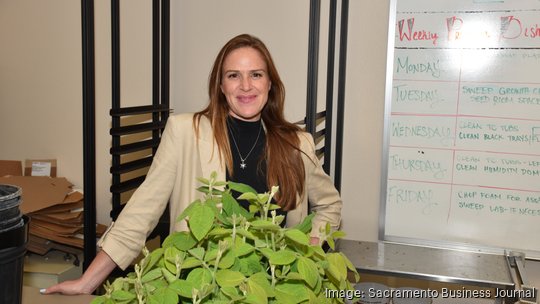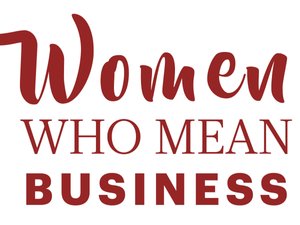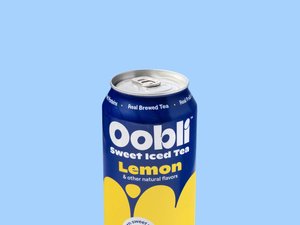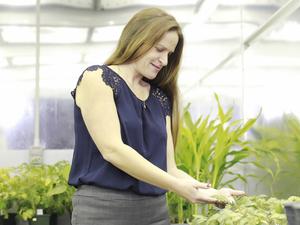
Shely Aronov’s Davis-based company InnerPlant is bringing to market fluorescing plant trait technology to help farmers get higher yields using fewer expensive chemicals by pinpointing early on where in the field crops need help.
The target crop is soybeans, which tend to be grown in vast acreage, so pinpointing problems allows farmers to use a little chemical where it is needed rather than broadcasting chemicals over hundreds or thousands of acres.
"Everything in a business exists to solve a problem. You need to make something your customers need," she said.
The solution Aronov is developing makes for a more efficient process.
“There is a ton of opportunity in the area of making spraying more effective by spraying only where it is needed,” said John Selep, president of AgStart, a Woodland accelerator for ag and food startups.
The plant and data technology are important, and that’s why she put the company in Davis, with access to the talent around the University of California Davis, one of world's top ag research campuses.
But Aronov is adamant that even more important than a great product, a company must have a rigorous business model so that it can get its product to succeed in the marketplace and reach customers.
It’s a lesson she learned with her previous company, which made hummus. It was a different company with a vastly different market and an entirely different product, but the lesson stuck still the same: It doesn’t matter if the product is best if the business model doesn’t get it to customers.
Early in her career, she took advice of a mentor who said that building the best product is all that matters. Now she believes the business model is as important.
Her previous company, San Francisco-based Yamba Hummus, made Israeli-style hummus for retail that was focused on great flavor, rather than on shelf stability.
In the mid 2010s, the market's leading hummus brand ran into problems with salmonella contamination of its products, and it was pulled from supermarket shelves. But rather than Yamba being able to exploit the lack of a major competitor, the national competitor paid to maintain its supermarket shelf space even though the shelves were empty.
“How do you compete with that?” Aronov asked. The answer, she said, is to have a significant enough and good enough business model.
She pivoted and pursued an entirely different entrepreneurial journey in agriculture, but she pursued it with a very specific business model.
“Agriculture is a highly concentrated industry. You have to find a way in,” she said.
Her way into agriculture was a business plan based on four principles that are achievable. Those included it working on the lion’s share of acreage; the signal being detectible from space; the technology being passive; and the technology being able to be integrated in large datasets.
She had previously seen research on green fluorescent protein by her father-in-law at Tel Aviv University. The team was working on highly technical and esoteric work to publish a novel academic research paper. Aronov saw business applications of green fluorescent protein, or GFP, originally isolated from jellyfish in the 1960s by a Japanese researcher who won a Nobel Prize in Chemistry for his work.
The protein signaling is visible to ultraviolet light.
InnerPlant uses genetic modification to give plants the GFP to communicate visually via special filters on satellite images when they are just beginning to show signs of problems.
Crops with InnerPlant traits fluoresce under strain, which allows smart equipment using satellite data to pinpoint areas that need treatment. Farmers see problems quickly in the field, rather than waiting several weeks to see damage.
The company's traits are genetically manufactured organisms, or GMO, but Aronov said that about 95% of soybeans are GMO themselves.
InnerPlant is leveraging the expertise of existing satellite networks and existing farm equipment technology and bringing to the table its data and science.
“Friction kills business. We are not inventing these systems, we are using what exists,” she said.
In 2022, Illinois-based farm equipment giant Deere & Co. (NYSE: DE) led a $16 million funding round into InnerPlant.
The company is expanding this spring from 8,000 square feet into 20,000 square feet of space at its headquarters.
Raised in Israel, Aronov served in its army for two years. “The most important things I learned as an entrepreneur I learned serving in the military," she said, citing leadership, responsibility and strength under pressure.
“The job of an entrepreneur is easy on the easy days. The challenge is showing up on the hard days,” she said.
The Essentials
Name: Shely Aronov
Title: CEO
Age: 41
Education: MBA, Stanford University, 2011; B.S., industrial engineering, Tel Aviv University, 2007.
Career: CEO InnerPlant, 2018-present; founder Yamba Hummus, 2012-2017; business development, National Semiconductor; supply chain consultant, Minet Technologies (Israel).
Personal/family: Lives in San Francisco with husband and two young daughters.
Passion (outside of work and family): Cooking
Biggest misunderstanding about your job: "A CEO’s job is less about telling people what to do and more about setting a vision, recruiting great people to join the vision, and giving them the resources they need to succeed."
First job: Waiting tables







